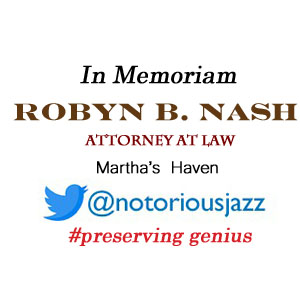
Daily Dose Of Jazz…
John Francis Picard was born May 17, 1934 in Tottenham, London, England and started learning music when he was seven years old by taking lessons on the piano.
After serving in the RAF, during which he played on weekends with Cy Laurie, he spent a further four months with Laurie before joining Humphrey Lyttelton, from 1954 until 1961. Through the Sixties and into the early 1970s he worked with Tony Coe as well as co-leading a quintet with Kathy Stobart. Then beginning in 1975 to 1983, he was a member of the London Jazz Big Band, led by Stan Greig.
During the early 1980s, with his friends Ian Stewart, Colin Smith and Dick Morrissey, he was a founding member of Rocket 88. and later went on to join the Charlie Watts Big Band.. Trombonist John Picard continues to perform.
More Posts: bandleader,history,instrumental,jazz,music,trombone
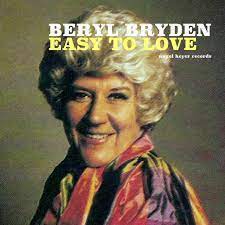
Daily Dose Of Jazz…
Beryl Audley Bryden was born May 11, 1920 in Norwich, Norfolk, England and was an only child Her enthusiasm for jazz music started during her teenage years, becoming a member of the National Rhythm Club when she was 17 and became secretary of the local branch in 1941. An ardent jazz fan she established a Nat Gonella fan club in her teens, before taking up the washboard and singing, influenced by Bessie Smith.
Moving to Cambridge in 1942 at 22, post WWII she returned to London with the hope of starting a career in music/ She worked with Mick Mulligan and George Melly at London jazz venues and became a supporter of visiting American jazz acts when the Musicians Union ban was lifted. Beryl befriended, amongst others, Buck Clayton, Louis Armstrong and Bud Freeman, with whom she recorded.
By 1949 she formed her own group called Beryl’s Back-Room Boys and later worked with Mike Daniels. In 1955 she joined the Chris Barber band on washboard, and played on Rock Island Line with Lonnie Donegan on vocals. This track helped trigger the ‘skiffle’ craze of the late 1950s.
Graduating to the Monty Sunshine jazz band she covered Bessie Smith’s Young Woman’s Blues, Gimme a Pigfoot (And a Bottle of Beer, and Coney Island Washboard Blues, which demonstrated her washboard technique.
She remained active at the end of the British trad jazz boom, and became particularly popular in Northern Europe, playing with the Ted Easton Jazz Band and The Piccadilly Six. She was active well into the Nineties playing with the Metropolitan Jazz Band, Digby Fairweather, Nat Gonella and her own Blue Boys.
Vocalist Beryl Bryden, whose final recording was with Nat Gonella shortly before her death, transitioned from lymphoma, aged 78, at St Mary’s Hospital, Paddington, England on July 14, 1998
More Posts: bandleader,history,instrumental,jazz,music,vocal,washboard
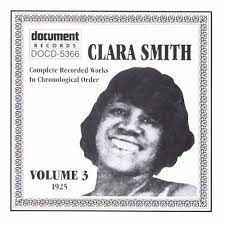
Daily Dose Of Jazz…
Leon Alexander Anthony Abbey was born in Minneapolis, Minnesota on May 7, 1900 to Luther James Robert Abbey and Eva Lee Alexander. He started his career in 1920 as a classical violinist with the orchestra of J. Rosamond Johnson. Five years later, he recorded with Clara Smith on If You Only Knowed and You Better Keep The Home Fires Burning.
By 1926, Leon was leading the Savoy Bearcats and toured with the band the next year in Argentina, Brazil, and Uruguay. For a decade, he toured throughout Europe and performed in India two times.
Abbey led a band with blues singer Ethel Waters. In Chicago, Illinois he led a trio until 1964. His sideman during his career included Fletcher Allen, Emile Christian, Bill Coleman, Peter DuConge, and Crickett Smith. He recorded Jazz and Hot Dance in Denmark as a leader in 1938 on Harmony Records in Copenhagen, Denmark. It was also issued under the name Whoa Babe.
Violinist and bandleader Leon Abbey transitioned in September 1975.
More Posts: bandleader,history,instrumental,jazz,music,violin
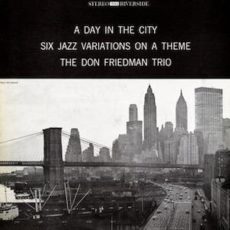
Daily Dose Of Jazz…
Donald Ernest Friedman was born in San Francisco, California on May 4, 1935 and began playing the piano at the age of four, switching from classical music to jazz after his family moved to Los Angeles, California when he was fifteen. His early jazz piano influence was Bud Powell and he briefly studied composition at Los Angeles City College.
He began playing in Los Angeles and moved to New York City in 1958. During the 1960s, he played with both modern stylists and more traditional musicians. The former included Coleman, Eric Dolphy, Jimmy Giuffre, Booker Little, and Attila Zoller; the latter, Bobby Hackett and Herbie Mann.
His debut album as a leader was A Day in the City, recorded in 1961. A few of his early albums received top ratings from DownBeat, which also gave him its critics’ poll New Star award. On the West Coast, Friedman performed with Dexter Gordon, Chet Baker, Buddy DeFranco, and Ornette Coleman. He was also a member of Clark Terry’s big band.
Pianist Don Friedman, who was also an educator in New York and had many fans in Japan, transitioned from pancreatic cancer on June 30, 2016 at his Bronx home.

More Posts: bandleader,history,instrumental,jazz,music,piano
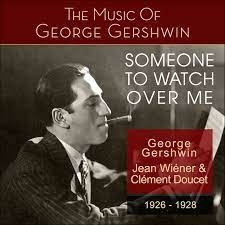
Daily Dose Of Jazz…
Léon Clément Doucet was born on April 9, 1895 in Brussels, Belgium. For a time he studied at the city’s Conservatoire under Arthur De Greef, who had been a pupil of Franz Liszt.
His formal training was classical, though as he traveled to the United States where he gained some influence from jazz. Some of his arrangements are still played today, including Chopinata, a jazz tribute to several works by Frédéric Chopin.
After returning to Europe, Clément became the house pianist at the Parisian cabaret Le Boeuf sur le Toit, succeeding Jean Wiéner. He and Wiéner formed a piano duo that spanned 15 years from 1924 to 1939. They performed over 2000 concerts and made over 100 recordings of jazz, blues, and classical music.
They also made a small number of recordings in which they accompanied French chansonniers. These include ten sides with Maurice Chevalier, Édith Piaf, Yvonne George, Jean Sablon and Germaine Sablon and others.
Pianist Clément Doucet transitioned at the age of 55 on October 15, 1950 in his hometown.
More Posts: bandleader,history,instrumental,jazz,music,piano


